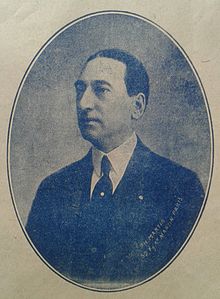Henri Christiné

Henri Marius Christiné (27 December 1867 – 25 November 1941) was a French composer of Swiss birth.[1]
The son of a French
Fragson. He also conducted for the music hall
at the Place Clichy.
Although Christiné wrote some
Bouffes-Parisiens. This success was followed by Dédé in 1921, Madame (1923) and J'adore ça (1925). These works were in the forefront of a new fashion in music-theatre: sparkling, witty, jazzy musical plays.[4] Christiné's tunes often build on repeated refrains of six or seven notes (a 'hook') which made them catchy and popular for contemporary audiences.[5]
In the 1930s Christiné contributed to the renewed fashion for more large-scale spectacular musicals, with pieces for the Théâtre du Châtelet in Paris, Au temps des Merveilleuses and Yana; for these he wrote the more vibrant numbers, while Richepin did the romantic songs.[6] "Le Bonheur, Mesdames" and "Le Flirt ambulant" were rearrangements of his songs from the 1900s.[7] He died in Nice, France.
Phi-Phi and Dédé are still occasionally revived in France.
Works
- 1903 : Service d'amour, Brussels
- 1904 : Mam'zelle Chichi, Paris
- 1907 : Les Vierges du harem, Brussels
- 1908 : Cinq minutes d'amour, Paris
- 1918 : Phi-Phi, Paris
- 1921 : Dédé, Paris
- 1923 : Madame, Paris
- 1925 : J'adore ça ; PLM,[8] Paris
- 1926 : J'aime !, Paris
- 1929 : Arthur, Paris
- 1931 : Encore cinquante centimes (with Maurice Yvain), Paris
- 1933 : La Madone du promenoir ; L'Affaire Brocs, Paris
- 1934 : Le Bonheur, mesdames ! ; Au temps des Merveilleuses (with Tiarko Richepin)
- 1934 : La Poule ; Yana (with Tiarko Richepin)
Songs
- "Le beau gosse"
- "Jamais en colère"
- "A la Martinique"
- "Le long du Missouri"
- "La Baya"
- "La petite dame du Métro"
- "Dans la vie faut pas s'en faire"
- "Oh ! Maurice"
- "Je sais que vous êtes jolie"
- "Ah ! Voui"
- "L'amour"
- "L'amour qui rit"
- "Un bon mouvement"
- "Le beau môme"
- "Chanson des petits païens
- "Elle n'est pas si mal que ça"
- "Faut jamais dire ça aux femmes"
- "Je suis républican"
- "Mon cœur"
- "Pas pour moi"
- "Quand un soldat.."
- "Que je n'ose pas dire"
- "Viens poupoule !"
- "Si j'avais su"
- "La Petite Tonkinoise" (1905)
- "Elle est épatante"
- "Je connais une blonde"
- "Reviens"
- "Valentine"
- The Medinettes (Suzy)"
References
- ^ Gänzl K. Henri Christiné. In: The New Grove Dictionary of Opera. Macmillan, London and New York, 1997.
- ^ Bruyr J. Que sais-je? L'operette. Presses Universitaires de France, Paris, 1962.
- ^ Ziegler J. Booklet notes accompanying CD 461 961-2, Dédé, 2001.
- ^ Gänzl K. Henri Christiné. In: The New Grove Dictionary of Opera. Macmillan, London and New York, 1997.
- ^ Nichols R. The Harlequin Years: music in Paris 1917-1929. Thames & Hudson, London, 2002.
- ^ Traubner R. Operetta, a theatrical history. Oxford University Press, Oxford, 1983.
- ^ L'encyclopédie multimedia de la comédie musicale théâtrale en France (1918-1940), accessed 13.8.09
- ^ (Le Train Bleu)
External links
- Henri Christiné at IMDb
